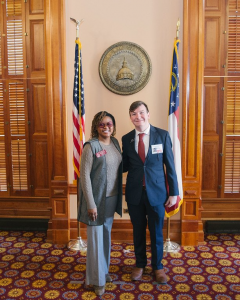Gold Dome Digest
Gold Dome Digest is an ongoing series of updates and analysis of bills moving in the Georgia General Assembly during the 40-day session.
As we approach the end of February, the Georgia General Assembly is only now in the pre-Crossover Day crunch. Having begun session at the last possible moment and only begun legislating in earnest after the Atlanta Superbowl was passed, the real work of this year has been unusually back-loaded relative to other sessions when the hurry to resume fundraising after Sine Die is usually front of mind for many elected officials.
For civic-minded readers, House Bills 302 and 511, as well as Senate Bill 143 will be of particular interest for their proposed changes to the Georgia development and transportation spheres: HB302, authored by Rep. Vance Smith (R-Pine Mountain) would remove ‘building design’ of one or two-family homes from the regulatory purview of municipalities. The bill has the support of Democratic Representative Spencer Frye (D-Athens) who explained his view as “from the lens of affordability”, although many who view the right of the public to regulate neighborhood design as a legitimate function of cities would likely dispute that the bill’s effects will be limited to increasing affordability.
SB143, introduced by transportation legislation powerhouse Senator Brandon Beach (R-Alpharetta), amends the MARTA Act to grant the agency bonding authority – a major boon to transportation finance. Although a lack of motion from the Senate Transportation Committee may indicate that the bill has lost favor, perhaps in favor of HB511, introduced by Transportation Committee Chairman Kevin Tanner (R-Dawsonville) which would replace the state sales tax applied to taxis and ridesharing services with a flat 50-cent fee. That could provide an estimated $30-60 million/year dedicated stream of funding for transportation agencies which would be reorganized with a Georgia Department of Mobility and Innovation “Gmobile” replacing GRTA. The bill is a 68 page tome describing the consolidation and allocation of funds and responsibilities. That bill is cosponsored across the aisle by Dean of the House Calvin Symre (D-Columbus) and Representative Terri Anulewicz (D-Smyrna).

Representative Park Cannon of the 58th and Kip Dunlap – Livable Buckhead’s Mobility Concierge
It is notable that the partisan atmosphere, usually not present by the time Legislative Session starts, is pronounced this year. With the special session arrest of Senator Nikema Williams -now Democratic Caucus leader- and Stacey Abrams continuing to pull at the threads of Governor Brian Kemp’s election, the background noise of party ideology cannot be ignored. Bills related to voting machines, redistricting, and womens’ leadership roles within Georgia Republican circles are cast in unusual contrast now, compared to the atmosphere of previous sessions where partisan talking points are less meaningful with elections safely past.
Democrats relative success in the November elections saw suburban districts oust all but the most popular GOP members, causing a distinct leftward-movement of suburban Republicans. For example, House Democrats have angled for needle-exchange and HIV prevention legislation for nearly a decade, with each session seeing those bills die in a medically sympathetic House Health and Human Services (HHS) Committee, chaired by Doctor and Marietta Republican Sharon Cooper, reticent to make waves. But there’s no end to what can be accomplished when Georgia Republicans are willing to carry previously Democratic bills; needle exchange and PrEP drug assistance measures passed out of HHS unanimously last week when Deborah Silcox (R-Sandy Springs) and Houston Gaines’ (R-Athens) names were the ostenisble authors, likely looking for centrist-cred with their changing constituencies.
Fights over ballot access and elections administration are still looming, though unlikely to make it past partisan votes in GOP controlled committees with the loudest clamour emanating from the ultra-high-profile HB316 pertaining to the actual ballot-marking electronic voting machines. As of Thursday, the House had voted to engross that bill – meaning that no amendments can be attached from the floor, and through parlimentary procedure debate is also limited, ensuring relatively smooth passage. Capitol watchers should expect a full-court press in the form of PR and lobbying from Abrams’ “Fair Fight Georgia” elections-fairness advocacy group to ramp up in an effort to stall that bill as it crosses to the Senate.
We are also learning today on Legislative Day 24 that bills relating to abortion and ‘religious freedom’ have been re-filed, setting up fights that have been rehashed in no fewer than the previous 6 sessions, although Governor Kemp has signaled that he is likely more supportive of those social conservative issues than his socially moderate, pro-business predecessor Governor Nathan Deal. If you recall last year’s session, several major businesses in Georgia took strong public stands on Religious Freedom Restoration Act (“RFRA”) type legislation, with less than subtle implications for their presence in Georgia. Then Lieutenant Governor Casey Cagle’s dust-up with Delta Airlines over a little-used NRA discount was viewed by many as an extension of that fight after Atlanta legacy Delta took the opposite side in that debate.
Looking ahead, March 7th will mark “Crossover Day”, the 28th day of the 40-day legislative session and the point at which all general bills must pass out of the chamber they were introduced in, in order to become law during this session. Bills that don’t pass or are tabled still have a chance in the second half of the 2019-2020 biennium. The final day of session is set for April 2nd, so there’s plenty of excitement still to come.
About the Author:
Kip Dunlap is Livable Buckhead’s Mobility Concierge and moonlights as Chief Legislative Aide to Representative Park Cannon whose district includes parts of Midtown, Downtown, Old Fourth Ward, Peoplestown, Pittsburgh, Summerhill, Sylvan Hills, and Capitol View. Over the past four legislative sessions Kip has acted as legislative policy analyst, speech writer, constituent contact, and intern-wrangler.




